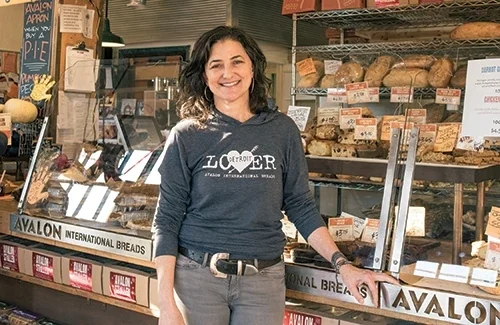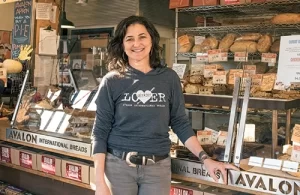
Jackie Victor, CEO and Co-founder, Avalon International Breads.
It’s no exaggeration to say that Avalon International Breads CEO and co-founder Jackie Victor thinks about her time at the University of Michigan on a daily basis. That is how influential those years are to her work in politics, social justice and, of course, feeding people.
Victor, who attended the University of Michigan from 1983 to 1988, met some of the most influential people in her life on campus, including Detroit grassroots organizers James and Grace Lee Boggs. That experience along with her volunteerism at an Ann Arbor co-op is what got her to move to Detroit and get into baking, she says.
But what Victor does at Avalon isn’t just baking — it’s about coming up with a recipe for a successful socially responsible business. It’s about rebuilding a city year after year, neighborhood after neighborhood. She’s humble about it, but it’s not an exaggeration either to say that Avalon and Victor herself have influenced a generation of Detroiters to break bread together since the bakery opened 25 years ago.
Her desire to help others and be a social conscious business was especially relevant during the pandemic. In fact, Victor wrote one of the most compelling small-business opinion pieces when she penned how coronavirus decimated Avalon in an opinion piece in The New York Times.
In that article, Victor wrote how the Paycheck Protection Program loan Avalon received likely saved the business–but that its future and that of Detroit were jeopardized because of the challenges this loan program and small businesses hit by the pandemic inherently experienced.
Her words resonated with so many other entrepreneurs–and it is one more way that Victor showed how her insight and resiliency were key factors in her personal and professional success. She cared for others, and she wanted everyone to have equal chance to survive the pandemic.
“The future of our business is unclear, and we are only just beginning to learn of the long-term social and economic impacts that the coronavirus will have on Detroit. If the terms of the Payment Protection Program change, it will be easier for us to make our way through this crisis and get back to the business of helping rebuild the city that we love,” she wrote.
Victor has a history with Detroit. Her grandfather, a Russian immigrant, owned a shop in Detroit’s Black Bottom, and her father grew up there. Victor and her siblings were raised in Oakland County and she graduated from what is now known as Bloomfield High School. It was a privileged life, but her parents kept them grounded, she says.
But it wasn’t until two influential University of Michigan classes that Victor thought about her own life, both in terms of how and where she wanted to live. The first memory was how a professor walked the class through an exercise on class and social disparities, waking Victor up to perceptions versus reality.
The next class was called architecture and social change, and the professor brought in the Boggs’ as speakers. Victor says that conversation directly influenced her decision to move to Detroit as soon as she could.
“They talked to use about their work in the neighborhoods, how rebuilding had to take place on a human and relational level,” Victor says. “James used to say it like this: ‘Neighbor by neighbor, church by church, garden by garden.’ … For me, the most exciting thing I could think of doing as to work on social change in the city of Detroit.”
Another influential moment was the work she did as a volunteer at an Ann Arbor co-op called Wild Flour. “I remember thinking, ‘This is a very honest way to make a living.’” Similar sorts of co-ops also existed in Detroit, and Victor remembers one in the Cass Corridor that was thriving.
While politics and social justice became her main calling, jobs sometimes were in short supply. When she was in between gigs around 1997, her friend, Ann Perrault, suggested that they take a look at starting their own bakery in Detroit, inspired by Victor’s own dreaming and that Cass Corridor co-op.
They rented a tiny space on Willis Street in Detroit for $500 a month. It had no windows, a plywood floor and only a single lightbulb, Victor says. As they grew, Victor says they began to fix up the building, even suggesting to the landlord that they add windows to the space.
“The landlord said: ‘I don’t think the neighborhood is ready for windows.’ That was the narrative at the time — Detroit’s not open for business. You’ll be met with hostility or crime. There’s no demand for a high-quality product. And all of those things were just so totally wrong,” Victor says.
It took years of work — coming in early, staying late, hustling and learning — to get Avalon to where it is now. But those lean years remind Victor of another of James Boggs’s famous phrases that went something like this, Victor says: “Don’t wait for the man to get you a job. Bake your own bread. Build your own bike. Fix your own shoes.”
Today, in developing Avalon’s footprint across Detroit and Ann Arbor, Victor says she has always wanted a community-minded place where people meet, eat and organize a better world. That may be why you never know who you’ll run into at Avalon from CEOs to small-business owners to everyday working people who are drawn to her energy and optimism.
“I’m not a baker. I’m not a business person. Those weren’t my primary goals,” Victor says. “I see the bakery more as a pathway to this revitalization of Detroit and of the community. We’re building a sustainable economy from the ground up.”


